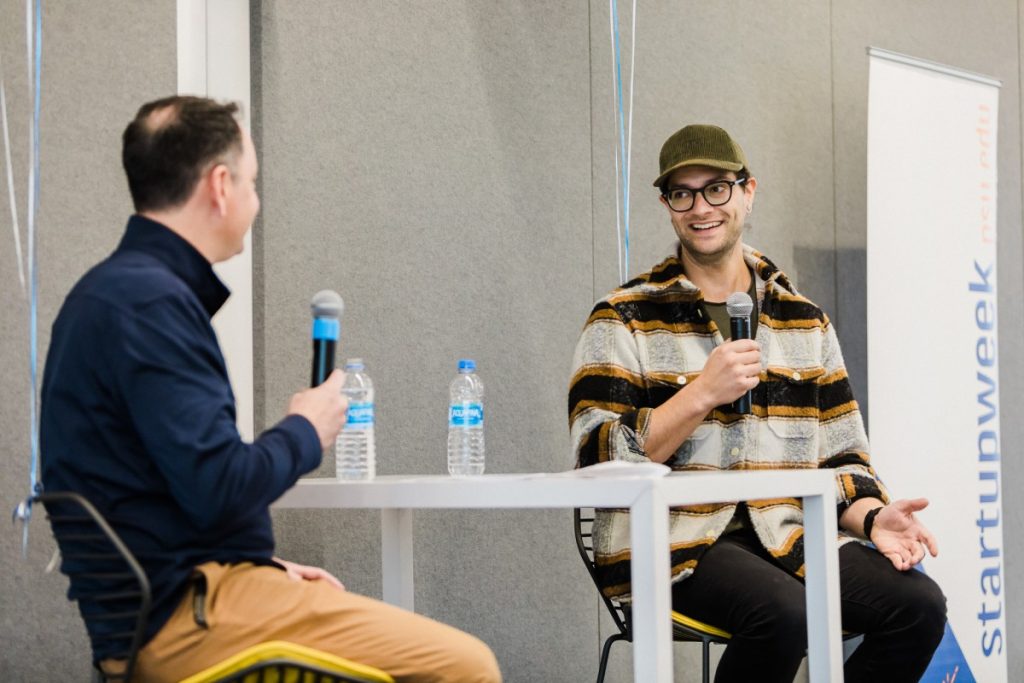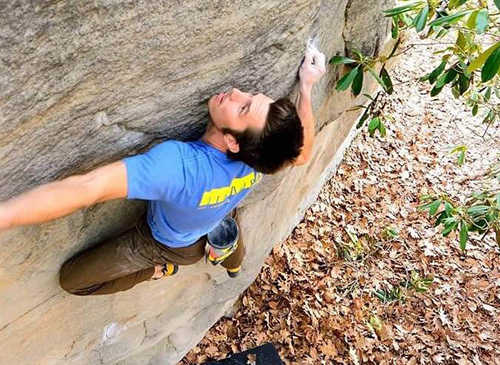PHOTO: Invent Penn State/Rick Brandt
In 2012, JT Marino was part of a startup that was floundering and pivoting. He was only three years out of Penn State, but that was enough time to recognize the tell-tale signs of startup death. It was also enough time to know that he wanted to start something of his own.
He partnered with Daehee Park, who he’d met via the entrepreneurship program at Penn State, to create mattress company Tuft & Needle, which would go from a $6,000 personal investment to $250 million annual revenue run rate in just six years, with no outside investments, while disrupting an entire industry. And they did it by asking one question: What’s a pain in our ass that we wish we could fix?
“There are may not be any universal secrets to success,” Marino said. “But we’ve found one common denominator: successful entrepreneurs fix something that’s broken in their own lives.”
Mattress shopping experience that “totally sucked” turns into a startup idea
Marino and Park started to write down past experiences that were “a pain in the ass” and their lists grew and grew. Around this time, Marino had been shopping for a mattress and found the experience “totally sucked,” so he added it to their list of pains.
“We kept coming back to the mattress idea,” he said. “It was oddly eccentric. It was the least sexy thing on that list. And it made us laugh. That was the joke, but we chose it anyway.”
They built a single-page website to work through the questions of what was painful about mattress buying, and what would improve the process. It was a test site with no product — and within 15 minutes of launching it, someone attempted to place an order.
“There are may not be any universal secrets to success,” Marino said. “But we’ve found one common denominator: successful entrepreneurs fix something that’s broken in their own lives.”
“We had a decision to make — stay in tech, or do something different — and we decided to jump off that cliff,” he said.
So they jumped. They named their concept Tuft & Needle and iterated a painless way to buy a simple, comfortable, affordable mattress and have it shipped straight to the customer’s door. “This was before Casper and Purple. This had never been done before — we had to figure it all out and then others followed,” said Marino.
“Give people what they want and they’ll reward you with their dollars”
Their initial struggles weren’t with market fit or product, it was with intentional constraint. “We decided not to bring in investors, so, the first year, our growth was really slow. But that gave us time to iterate with customers and get feedback. We just kept polishing the product and service,” Marino said.
He looks back at those early months as the “entrepreneur pit of sorrow,” saying, “We weren’t sure if it was going to flop or grow, and there were a few times when we almost pulled the plug.”
As the business slowly grew, the two decided to relocate from Silicon Valley to Phoenix, Arizona, a move Marino calls a powerful and important decision that not only kept costs low, but allowed Tuft & Needle to continue to iterate with customers.
“We weren’t sure if it was going to flop or grow, and there were a few times when we almost pulled the plug.”
He said, “We kept making changes based on feedback. We cut out the stuff that didn’t matter. We figured out how to shrinkwrap mattresses so we could ship them instead of scheduling delivery. But what if they wanted to return it? We found a way for them to donate them instead of mailing back. We became the anti-mattress company and that made us grow like crazy. Give people what they want and they’ll reward you with their dollars.”
At the same time, a few competitors started to fill the “disruptive mattress” space.
“Early investors usually don’t like competition,” Marino said, “but that’s a mistake. Competition helped us grow so fast. Those other companies had big marketing budgets and a percentage of all the people who found them then found us. A percentage of their advertising dollars became our dollars. Plus the competition helped us keep our edge and not settle.”
“Values start with how founders talk and make decisions”
As their company built momentum, Marino said that their values drove the growth. “Values start with how founders talk and make decisions. It’s a cliche to say ‘customers first,’ but our yes-and-no decisions were based on that.”
“The next thing that was very important to us was how we hired,” he added. “We initially looked for people we wanted to hang out with — young and cool — until we realized we needed to find people who better represented our customers and who truly encapsulated what our brand needed to be. We started to look for hard workers who, at their core, really cared about other people, had high integrity, and who were makers and fixers. When you build a team like that, they treat customers differently and the outward brand reflects the inward culture. People care about the brand, and that draws in employees who have those kinds of values. It’s hard to put a dollar amount on values and culture.”
By 2018, just six years after the initial $6,000 investment, the company had over $250 million in revenue. In September of that year, they closed a merger with the largest mattress manufacturer Serta Simmons Bedding. Marino joined the company as Chief Disruption Officer, helping the mattress giant transform its company with the simplicity, ethos and drive that enabled so much success for Tuft & Needle.
“Penn State’s networking and support has been the biggest help to me”
In April, Marino comes back to Happy Valley as the first entrepreneur-in-residence. He will be speaking at the Invent Penn State Venture & IP Conference on April 29.
“One of the most impactful things that Penn State did for me was creating a custom entrepreneurship program based on the real-world work that I was doing. Today it’s called the Entrepreneurship and Innovation Minor and can be added to any major. It was great knowing that the school valued entrepreneurism. Having professors cheer for you was super helpful and gave me confidence. I met Daehee Park through that program, and who knows what would have happened if I hadn’t met him,” said Marino. “Penn State connected me with a lot of people who have been touched by Penn State in one way or another, and that was very helpful for me. It gave me a lot of numbers to call. The networking, the people and the support — that’s been the biggest help to me.”
“Give people what they want and they’ll reward you with their dollars.”
While Marino is in town, he’ll be speaking in classes and meeting with students — and he has some advice for the next generation of disrupters.
“It’s really important to have a co-founder,” he said. “Be part of a community of entrepreneurs. Be connected with those who have been successful. Rather than searching for an idea, look for something that’s been a pain in your life. You are your first customer; if it’s been a pain for you, it’s been a pain for someone else. Then, if you have to put in the time and just do it! The sooner you get a stranger to pay you money for a product that you created, the sooner you will validate that you’re onto something.”
Cara Aungst writes about industry, innovation and how Happy Valley ideas change the world. She can be reached with story ideas and comments at Cara@AffinityConnection.com.







